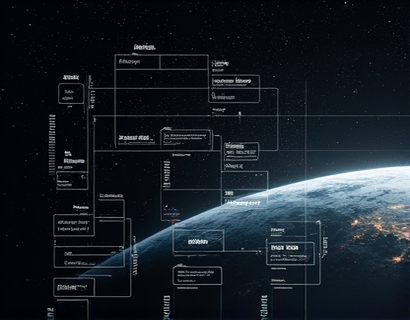Decentralized DAO Management: Transforming Governance with Advanced Analytics and Collaboration Tools
In the rapidly evolving landscape of decentralized finance and autonomous organizations, the management of Decentralized Autonomous Organizations (DAOs) has become a critical area of focus. Traditional governance models are being reimagined to incorporate advanced analytics and collaboration tools, enabling more efficient, transparent, and data-driven decision-making processes. This transformation is not just a technological upgrade but a fundamental shift in how DAOs operate, ensuring sustainable growth and enhanced member engagement.
Understanding DAO Governance
Before delving into the advancements in DAO management, it's essential to understand the core concept of DAO governance. A DAO is a digital entity governed by smart contracts on a blockchain, allowing for decentralized decision-making. Members of the DAO, typically token holders, propose and vote on changes to the organization's rules and direction. This model aims to eliminate centralized control, reduce the risk of corruption, and foster a more democratic and inclusive governance structure.
However, the decentralized nature of DAOs also presents significant challenges. Coordinating actions across a global and diverse membership base, ensuring transparency in transactions, and making informed decisions based on comprehensive data are just a few of the hurdles. Traditional methods of governance often fall short in these areas, leading to inefficiencies and potential conflicts.
The Role of Advanced Analytics in DAO Governance
Advanced analytics plays a pivotal role in transforming DAO governance. By leveraging sophisticated data analysis tools, DAOs can gain deep insights into member behavior, proposal trends, and overall organizational health. These insights are crucial for making informed decisions that align with the best interests of the community.
One of the primary benefits of advanced analytics in DAO management is the ability to predict and respond to trends. For instance, by analyzing voting patterns and proposal outcomes, a DAO can identify which types of proposals are more likely to gain traction and adjust its strategy accordingly. This predictive capability allows for proactive governance, reducing the risk of failed proposals and enhancing member satisfaction.
Moreover, analytics can help in identifying potential governance risks. By monitoring transaction flows, token distribution, and member activity, a DAO can detect anomalies that may indicate fraudulent behavior or internal conflicts. Early detection of such issues enables swift action, maintaining the integrity and trust within the organization.
Enhancing Collaboration through Advanced Tools
Collaboration is the lifeblood of any successful DAO. Advanced collaboration tools are essential for fostering effective communication and coordination among members. These tools go beyond basic messaging and file-sharing, offering features that streamline the proposal and voting processes, facilitate real-time discussions, and ensure transparency in all activities.
One key feature of these tools is the integration of smart contracts for automated workflows. Smart contracts can automate the execution of governance actions once certain conditions are met, reducing the need for manual intervention and minimizing the risk of human error. For example, a smart contract can automatically distribute voting tokens to eligible members, tally votes, and announce the results, all in a transparent and tamper-proof manner.
Real-time collaboration platforms enable members to work together on proposals, share insights, and provide feedback in a structured and organized way. These platforms often include features like version control, comment threads, and activity logs, ensuring that all contributions are recorded and accessible. This level of transparency builds trust and encourages active participation from all members.
Streamlining Decision-Making Processes
Efficient decision-making is crucial for the smooth operation of a DAO. Advanced governance software can significantly streamline this process by providing a centralized and user-friendly interface for managing proposals and votes. Here are some key ways in which these tools enhance decision-making:
- Proposal Management: Advanced tools allow members to create, edit, and track proposals with ease. Features like priority levels, deadlines, and comment sections ensure that all relevant information is readily available. Members can also view the history of similar proposals, providing context and preventing redundant discussions.
- Voting Mechanisms: Secure and transparent voting systems are essential for fair and democratic decision-making. Advanced tools offer various voting mechanisms, including simple majority, weighted voting, and multi-round voting. These systems ensure that each vote is counted accurately and that the results are immediately visible to all members.
- Reporting and Analytics: Comprehensive reporting tools provide detailed insights into proposal and voting outcomes. Dashboards can display key metrics such as participation rates, proposal success rates, and member engagement levels. These insights help leaders make data-driven decisions and adjust strategies as needed.
Fostering Transparency and Trust
Transparency is a cornerstone of successful DAO governance. Advanced analytics and collaboration tools contribute significantly to building and maintaining trust within the organization. Here's how:
Firstly, transparency in data is paramount. By providing real-time access to relevant metrics and reports, members can stay informed about the organization's performance and the impact of their decisions. This openness fosters a sense of ownership and accountability among members.
Secondly, the immutable nature of blockchain technology ensures that all transactions and decisions are recorded and cannot be altered. This level of security and permanence builds trust, as members can verify the integrity of the governance process at any time.
Lastly, advanced tools often include features that promote open communication. For example, public forums and discussion boards allow members to voice their opinions, ask questions, and seek clarification on proposals and decisions. This open dialogue helps to address concerns and align the community around common goals.
Challenges and Considerations
While the integration of advanced analytics and collaboration tools offers numerous benefits, it is not without its challenges. One of the primary concerns is the technical complexity involved in implementing these systems. DAOs must ensure that their members have the necessary skills and support to effectively use these tools. Providing training and documentation can help bridge this gap.
Another consideration is the potential for data overload. With vast amounts of data at their disposal, members and leaders must focus on extracting actionable insights rather than getting lost in the noise. Advanced analytics tools should be designed to highlight key trends and recommendations, making it easier for users to make informed decisions.
Privacy and security are also critical issues. While transparency is essential, sensitive information must be protected. Implementing robust security measures and adhering to best practices in data management is crucial to maintaining the trust of all members.
Case Studies and Real-World Applications
Several DAOs have successfully implemented advanced governance tools, demonstrating their practical benefits. For instance, a decentralized content platform used a combination of analytics and collaboration tools to streamline its content moderation process. By analyzing user feedback and voting patterns, the DAO was able to identify and address content issues more efficiently, leading to higher member satisfaction and increased content quality.
Another example is a decentralized finance (DeFi) DAO that utilized smart contracts for automated governance actions. This approach reduced the time and resources required for proposal and voting processes, allowing the DAO to respond more quickly to market changes and member needs.
These case studies highlight the potential of advanced governance tools to enhance efficiency, transparency, and member engagement in DAOs. As more organizations adopt these technologies, the decentralized ecosystem is likely to become more robust and resilient.
Future Trends and Innovations
The field of DAO governance is rapidly evolving, with ongoing innovations poised to further transform the landscape. One emerging trend is the integration of artificial intelligence (AI) into governance tools. AI can analyze large datasets to provide predictive insights, automate routine tasks, and even suggest governance strategies based on historical data and current trends.
Another area of innovation is the development of interoperable governance platforms. As the ecosystem grows, the ability to seamlessly integrate and collaborate across different DAOs will become increasingly important. Standards and protocols that facilitate interoperability will play a crucial role in this development.
Additionally, the focus on user experience (UX) is likely to intensify. Governance tools that are intuitive, accessible, and user-friendly will be more likely to adoption. This trend will democratize access to advanced governance capabilities, empowering a broader range of members to participate actively in the decision-making process.
Conclusion
The integration of advanced analytics and collaboration tools represents a significant leap forward in DAO governance. By leveraging these technologies, DAOs can achieve greater efficiency, transparency, and member engagement. As the decentralized ecosystem continues to grow, the importance of robust governance frameworks will only increase. Embracing these innovations is not just an option but a necessity for DAOs aiming to thrive in the digital age.










































